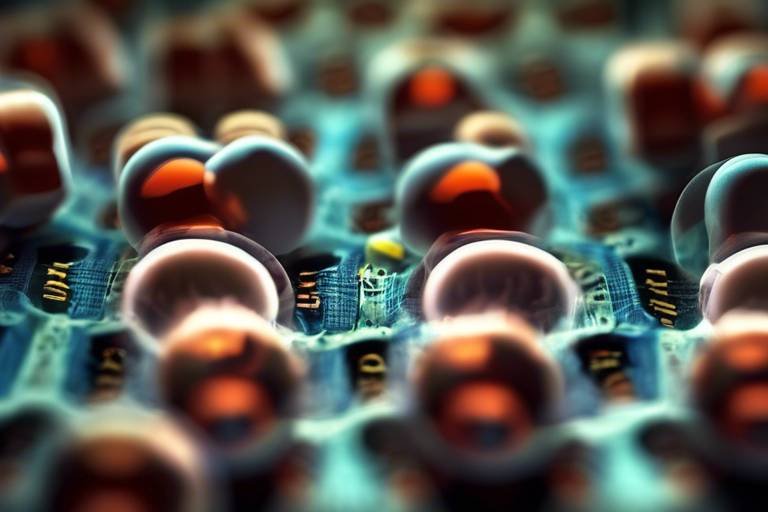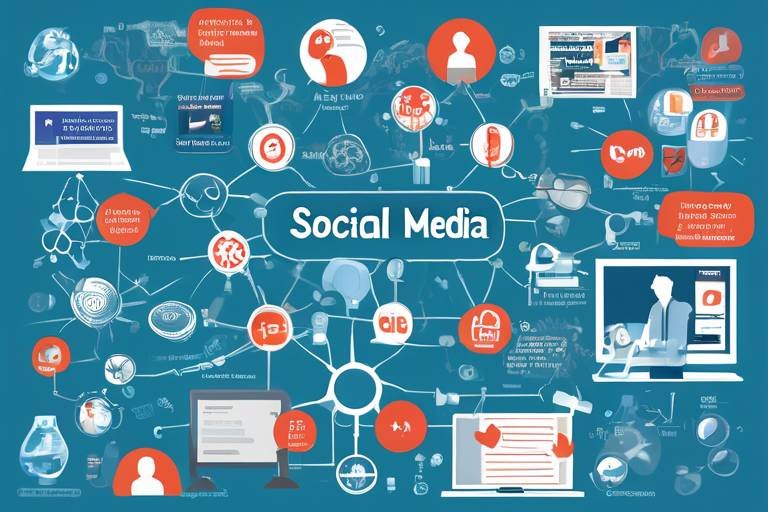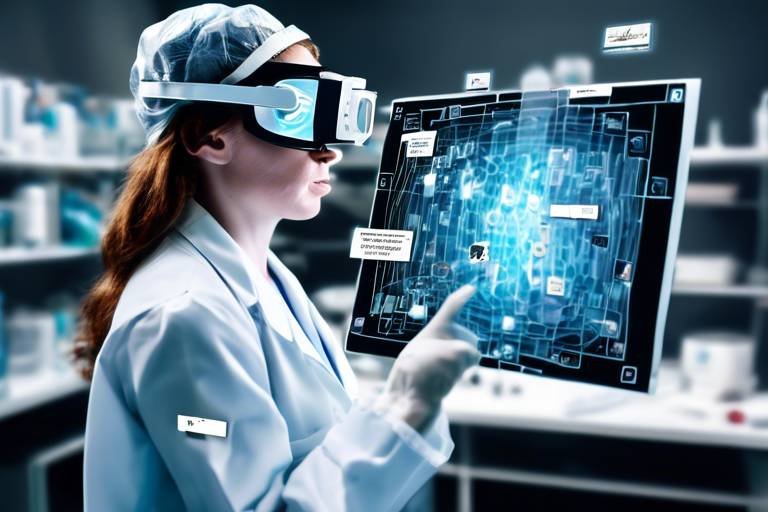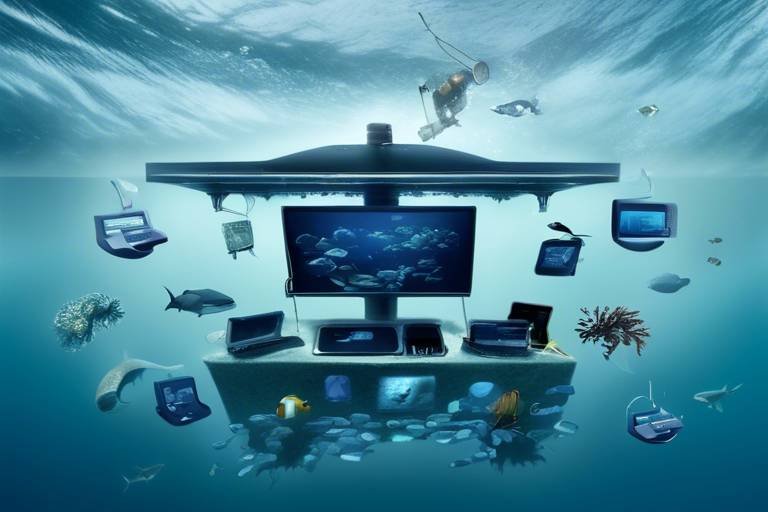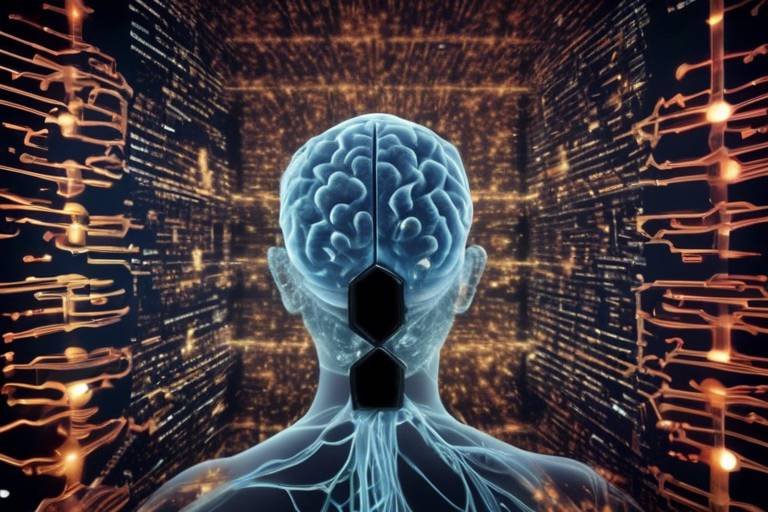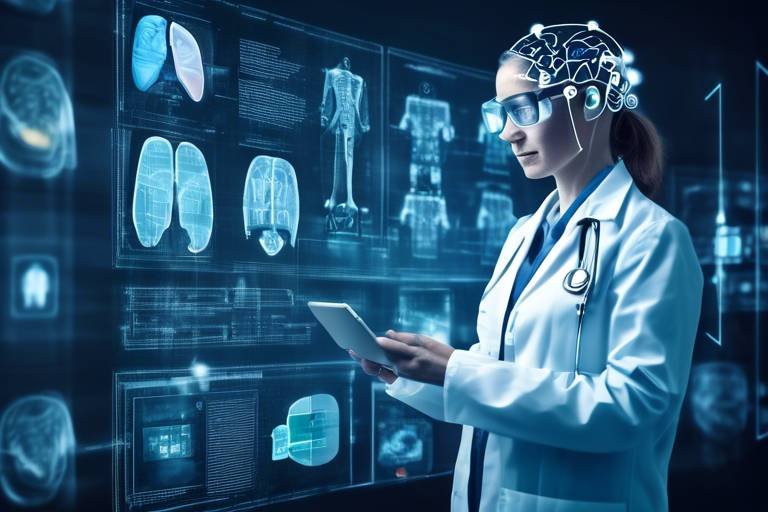Exploring the Ethics of Biotechnology and Science
In today's rapidly evolving world, the intersection of biotechnology and science raises profound questions about the ethical implications of our innovations. As we delve deeper into the realms of genetic engineering, stem cell research, and cloning, we find ourselves at a crossroads where scientific possibilities meet moral dilemmas. The advancements in these fields promise to revolutionize healthcare, agriculture, and environmental sustainability. However, with great power comes great responsibility, and it’s essential to navigate these waters with a clear understanding of the ethical frameworks that guide us.
Imagine a world where diseases that once plagued humanity are eradicated, where food scarcity is a thing of the past, and where our understanding of life itself is transformed. This is the potential that biotechnology holds. Yet, it also brings to the forefront questions that can make even the most seasoned scientists pause. Are we playing God? What are the long-term impacts of altering life at its core? These questions are not just philosophical musings; they are critical to shaping the future of our society.
As we explore the ethical landscape of biotechnology, we must consider several fundamental principles of bioethics. These include:
- Respect for Autonomy: Individuals have the right to make informed decisions about their own lives and bodies.
- Beneficence: Actions should promote the well-being of individuals and society.
- Non-maleficence: We must avoid causing harm to others.
- Justice: Fair distribution of benefits and burdens in society is essential.
These principles serve as a compass, guiding researchers, policymakers, and the public in their discussions about the ethical implications of scientific advancements. As we navigate this complex moral landscape, it’s crucial to engage in open dialogues that include diverse perspectives. After all, biotechnology does not exist in a vacuum; it affects all of us, and our collective input is necessary to shape its future responsibly.
Moreover, the public perception of biotechnology plays a significant role in shaping ethical discourse. Misinformation and fear can lead to resistance against beneficial technologies, while a well-informed public can foster acceptance and support for innovations that improve quality of life. Thus, effective communication and education about the benefits and risks of biotechnological advancements are paramount.
As we look to the future, we must remain vigilant and proactive in establishing robust regulatory frameworks and ethical guidelines. These frameworks should not only address current challenges but also be adaptable to emerging technologies and societal values. The ethical landscape of biotechnology is not static; it evolves alongside scientific advancements, necessitating ongoing discussions and adaptations.
In conclusion, the exploration of the ethics of biotechnology and science is not merely an academic exercise; it is a vital endeavor that impacts every facet of our lives. As we stand on the brink of unprecedented scientific breakthroughs, let us commit to a path that prioritizes ethical considerations, ensuring that our innovations serve humanity and the planet responsibly.
- What is biotechnology? Biotechnology is the use of living organisms or their components to develop products and technologies for various applications, including medicine, agriculture, and environmental science.
- Why is bioethics important? Bioethics helps navigate the moral implications of biotechnological advancements, ensuring that scientific progress aligns with societal values and ethical principles.
- What are the main ethical concerns in biotechnology? Key concerns include the potential for misuse of technology, long-term health effects, environmental impacts, and the moral status of living organisms.
- How can the public influence biotechnology ethics? Public perception and discourse can shape policy decisions, funding, and acceptance of biotechnological innovations, making informed public engagement crucial.

The Foundation of Bioethics
Understanding the fundamental principles of bioethics is crucial for navigating the complex moral landscape of biotechnology. At its core, bioethics seeks to address the ethical challenges that arise in the realms of biology and medicine, particularly as scientific advancements push the boundaries of what is possible. The four primary principles that form the bedrock of bioethical discussions are respect for autonomy, beneficence, non-maleficence, and justice.
Respect for autonomy emphasizes the importance of individual choice and the right of people to make informed decisions about their own lives and bodies. This principle is particularly relevant in the context of medical treatments and interventions, where patients should have the freedom to accept or refuse procedures based on their values and beliefs. Imagine being in a situation where someone else decides your treatment without your input; it can feel like a violation of personal freedom, right?
Next, we have beneficence, which encourages actions that promote the well-being of individuals and society as a whole. In the world of biotechnology, this principle drives researchers and practitioners to pursue advancements that can improve health outcomes and enhance quality of life. However, the challenge lies in ensuring that the benefits of such innovations are accessible to all, rather than just a privileged few. This leads us to the principle of justice, which calls for fairness in the distribution of healthcare resources and the burdens of research.
The principle of non-maleficence complements beneficence by stressing the importance of "doing no harm." This means that in the pursuit of scientific progress, we must remain vigilant about the potential risks and unintended consequences of our actions. For instance, while a new genetic treatment may hold promise for curing diseases, it is essential to consider its long-term effects on both individuals and the environment. This is where bioethics serves as a guiding light, helping us weigh the potential benefits against the risks.
In the context of biotechnology, these principles often intertwine, creating a rich tapestry of ethical considerations. For example, when discussing genetic engineering, one must consider how respect for autonomy plays a role in informed consent, while also evaluating the broader societal implications of genetic modifications. The ethical landscape is not merely black and white; it’s filled with shades of gray that require careful navigation.
To illustrate these principles further, let’s take a look at a simple table that summarizes how they interact within the field of biotechnology:
| Principle | Description | Application in Biotechnology |
|---|---|---|
| Respect for Autonomy | Honoring individual choices and informed consent | Patients should be fully informed about genetic treatments and their implications. |
| Beneficence | Promoting well-being and positive outcomes | Research should aim to develop effective treatments that improve health. |
| Non-maleficence | Avoiding harm to individuals and society | Consideration of potential side effects of new biotechnologies. |
| Justice | Ensuring fair access and distribution of resources | Equitable access to biotechnological advancements for all demographics. |
In conclusion, the foundation of bioethics is not just about adhering to a set of rules; it’s about fostering a culture of ethical reflection and dialogue. As we continue to innovate and push the boundaries of science, we must remain committed to these principles, ensuring that our advancements in biotechnology serve humanity in a responsible and ethical manner.
- What is bioethics? Bioethics is the study of ethical issues arising from advances in biology and medicine, focusing on the moral implications of scientific practices.
- Why is informed consent important? Informed consent ensures that individuals understand the risks and benefits of medical procedures, allowing them to make autonomous decisions about their health.
- How do bioethical principles apply to genetic engineering? The principles of bioethics guide the responsible use of genetic engineering by emphasizing respect for autonomy, beneficence, non-maleficence, and justice.

Genetic Engineering: Opportunities and Risks
Genetic engineering is like holding a double-edged sword; it offers remarkable possibilities while simultaneously presenting daunting risks. The ability to manipulate genetic material has opened doors to groundbreaking advancements in medicine and agriculture. Imagine a world where diseases can be eradicated before they even manifest, or crops can be designed to withstand extreme weather conditions. These advancements could revolutionize our lives, providing solutions to some of humanity's greatest challenges. However, this power comes with significant ethical considerations that we must navigate carefully.
One of the most exciting opportunities genetic engineering presents is in the field of medicine. With techniques like CRISPR-Cas9, scientists can target and edit genes responsible for hereditary diseases, potentially curing conditions such as sickle cell anemia or cystic fibrosis. This could lead to a future where genetic disorders are a thing of the past. Additionally, genetic engineering allows for the production of personalized medicine, tailored specifically to an individual's genetic makeup. This could enhance treatment efficacy and minimize side effects, leading to better overall health outcomes.
On the agricultural front, genetically modified organisms (GMOs) can help address food security by increasing crop yields and resistance to pests and diseases. For instance, genetically engineered crops like Bt corn produce their own insecticide, reducing the need for chemical pesticides. This can lead to more sustainable farming practices and a lower environmental impact. However, the introduction of GMOs into our food supply raises questions about food safety and ecological balance. What happens when genetically modified crops crossbreed with wild plants? Could we inadvertently create superweeds that are resistant to herbicides?
Despite these promising benefits, the risks associated with genetic engineering cannot be ignored. The potential for unintended consequences looms large. For example, while editing genes can help eliminate certain diseases, it may also introduce new health risks or genetic anomalies that we cannot yet predict. Furthermore, the ethical implications of "designer babies" arise when we consider the possibility of selecting traits such as intelligence or physical appearance. This leads to a slippery slope where the definition of what it means to be human could be altered, raising profound moral questions.
Moreover, the environmental impact of genetically engineered organisms is a significant concern. The long-term effects on biodiversity are still largely unknown. If a genetically modified species outcompetes its natural counterparts, it could disrupt entire ecosystems, leading to unforeseen consequences. The balance of nature is delicate, and tampering with it could have ramifications that echo through generations.
In summary, genetic engineering holds the potential to transform our world in ways we can only begin to imagine. However, with great power comes great responsibility. We must tread carefully, weighing the benefits against the risks and ensuring that ethical considerations guide our advancements. As we continue to explore the possibilities of genetic engineering, an open dialogue about its implications is essential. Society must engage in discussions that encompass not only the scientific aspects but also the moral dilemmas that arise from such profound capabilities.
- What is genetic engineering? Genetic engineering is the direct manipulation of an organism's genes using biotechnology.
- What are some benefits of genetic engineering? It can lead to medical breakthroughs, increased agricultural productivity, and enhanced food security.
- What are the risks associated with genetic engineering? Potential risks include unintended genetic consequences, ethical dilemmas, and environmental impacts.
- How is genetic engineering regulated? Regulations vary by country, but they generally involve oversight by governmental agencies to ensure safety and ethical standards.

Stem Cell Research: Ethical Dilemmas
Stem cell research is a fascinating yet contentious area in the field of biotechnology. It holds the promise of groundbreaking treatments for a variety of diseases, including Parkinson's, diabetes, and spinal cord injuries. However, the ethical dilemmas surrounding this research are as complex as the science itself. At the heart of the debate is the source of stem cells, which can be derived from embryos, adult tissues, or induced pluripotent stem cells (iPSCs). Each source carries its own set of moral implications and societal perspectives.
When we talk about embryonic stem cells, we're diving into a pool of ethical concerns that many find deeply troubling. The process of obtaining these cells typically involves the destruction of an embryo, which raises significant questions about the moral status of that embryo. Is it merely a clump of cells, or does it represent potential life deserving of protection? This question is not just academic; it touches upon deeply held beliefs about life and personhood, making it a hotbed for ethical debate.
On the other hand, adult stem cells and iPSCs offer alternatives that circumvent some of these ethical issues. Adult stem cells can be harvested from various tissues, such as bone marrow or fat, without the ethical baggage associated with embryos. iPSCs, created by reprogramming adult cells, also avoid the moral dilemmas posed by embryonic sources. However, the use of these alternatives introduces its own challenges, including limited availability and the potential for unforeseen complications in treatment outcomes.
Moreover, the potential for misuse of stem cell technology cannot be overlooked. As with any rapidly advancing field, there is a risk of unethical practices emerging, such as the commercialization of stem cell therapies without adequate scientific validation. This could lead to patients being exploited or subjected to unproven treatments that could do more harm than good. Therefore, it is crucial to establish ethical guidelines and regulatory frameworks to govern this promising yet perilous field.
In light of these dilemmas, public discourse plays a vital role in shaping the future of stem cell research. Engaging in conversations about ethics, potential benefits, and risks can help demystify the science and inform policy decisions. It’s essential for society to weigh the potential benefits of stem cell research against the ethical implications of how we source and utilize these powerful biological tools.
As we continue to explore the capabilities of stem cells, we must remain vigilant. Ethical considerations should not be an afterthought but rather an integral part of the research process. By fostering a culture of responsibility and transparency, we can ensure that the advancements in stem cell research serve humanity while respecting the moral complexities involved.
- What are stem cells? Stem cells are undifferentiated cells that have the potential to develop into different cell types in the body.
- Why is stem cell research controversial? The controversy primarily arises from the ethical implications of using embryonic stem cells, which involves the destruction of embryos.
- What are the alternatives to embryonic stem cells? Adult stem cells and induced pluripotent stem cells (iPSCs) are alternatives that do not involve the ethical concerns associated with embryos.
- What ethical guidelines govern stem cell research? Various organizations and regulatory bodies have established guidelines that emphasize the importance of informed consent, transparency, and the responsible use of stem cells.

Cloning: Scientific Possibilities and Moral Questions
Cloning, a term that often conjures up images of science fiction, has become a reality in the realm of biotechnology. It holds the potential to unlock remarkable advancements in medicine and agriculture, but with these possibilities come profound moral questions that society must grapple with. Imagine a world where we can replicate organs for transplants or even bring back extinct species—sounds like a plot twist in a blockbuster movie, right? Yet, the ethical implications of such power are anything but simple.
At its core, cloning can be categorized into two primary types: reproductive cloning and therapeutic cloning. Reproductive cloning involves creating a genetic copy of an organism, while therapeutic cloning focuses on generating cells or tissues for medical treatments. Both methods offer tantalizing possibilities:
| Type of Cloning | Potential Benefits | Ethical Concerns |
|---|---|---|
| Reproductive Cloning | Could help in preserving endangered species and restoring extinct ones. | Issues of identity, individuality, and the potential for exploitation. |
| Therapeutic Cloning | May lead to breakthroughs in regenerative medicine and organ replacement. | Concerns about the moral status of embryos used in research. |
However, as we stand on the brink of these scientific breakthroughs, we must ask ourselves: What does it mean to create life? Cloning challenges our understanding of individuality and uniqueness. If we can create a genetic replica of a human being, what does that mean for the original? Are we diminishing the value of life by treating it as something that can be mass-produced in a lab? These are not just hypothetical questions; they are profound dilemmas that society must confront.
Furthermore, the potential for cloning technology to be misused adds another layer of complexity. The idea of "designer babies," where parents could select traits for their children, raises ethical alarms. Should we have the power to dictate the genetic makeup of future generations? The slippery slope of such decisions could lead to a society divided by genetic privilege, where those with access to cloning technology could enhance their offspring while others are left behind.
Another significant concern is the impact of cloning on biodiversity. While cloning might seem like a solution to species extinction, it could also lead to a reduction in genetic diversity, making populations more susceptible to diseases and environmental changes. This raises the question: Are we playing God by intervening in natural processes? The responsibility that comes with such power cannot be overstated, and it necessitates a careful examination of both scientific and ethical boundaries.
As we explore the possibilities of cloning, it is crucial to foster an open dialogue among scientists, ethicists, policymakers, and the public. This conversation should not only focus on the technological advancements but also on the moral responsibilities that accompany them. By engaging diverse perspectives, we can better navigate the complexities of cloning and ensure that our innovations serve the greater good.
In conclusion, cloning stands at the intersection of scientific possibility and profound moral questioning. As we continue to push the boundaries of what is possible, we must remain vigilant in addressing the ethical implications of our actions. The future of cloning technology is not just about what we can do, but also about what we should do. As we ponder these questions, it's essential to remember that with great power comes great responsibility.
- What is cloning? Cloning is the process of creating a genetically identical copy of an organism.
- What are the types of cloning? The two main types are reproductive cloning and therapeutic cloning.
- What are the ethical concerns surrounding cloning? Ethical concerns include issues of identity, individuality, and the moral status of embryos.
- Can cloning be used to bring back extinct species? While theoretically possible, it raises significant ethical and ecological questions.
- How does cloning impact biodiversity? Cloning can reduce genetic diversity, making populations more vulnerable to diseases.

Biotechnology and Environmental Ethics
In today’s rapidly evolving world, the intersection of biotechnology and environmental ethics has become a hot topic, sparking conversations that are as complex as they are necessary. As we delve into this realm, it’s crucial to understand that biotechnology holds the potential to both harm and heal our planet. Imagine biotechnology as a double-edged sword; on one side, it offers solutions to pressing environmental issues, while on the other, it poses significant risks to biodiversity and ecosystems.
One of the most compelling aspects of biotechnology is its ability to address environmental challenges. For example, genetically modified organisms (GMOs) can be engineered to withstand harsh conditions, thereby increasing crop yields and reducing the need for chemical pesticides. This innovation not only promotes food security but also has implications for reducing agricultural runoff, which is a major contributor to water pollution. However, the introduction of GMOs into ecosystems raises important questions: What happens when these modified species interact with native flora and fauna? Could they outcompete natural species, leading to unforeseen ecological consequences?
Moreover, biotechnology can play a pivotal role in conservation efforts. Techniques such as gene editing can be utilized to help endangered species adapt to changing environments, potentially reversing the effects of habitat loss and climate change. Yet, this brings us to the ethical dilemma of whether we should intervene in nature's course. Are we playing god by altering the genetic makeup of species, or are we fulfilling our responsibility as stewards of the Earth? These questions highlight the need for a balanced approach, weighing the benefits against the moral implications of our actions.
The debate surrounding biotechnology and environmental ethics is not just limited to the scientific community; it extends into the realm of public policy and societal values. As innovations emerge, they often outpace existing regulations, creating a gap that can lead to environmental degradation. To address this, it’s essential to establish a robust regulatory framework that prioritizes environmental protection while fostering innovation. This framework should include:
- Comprehensive environmental assessments for biotechnological projects.
- Public engagement initiatives to involve communities in decision-making processes.
- Transparent reporting on the ecological impacts of biotechnological applications.
As we navigate this intricate landscape, it’s vital to promote a culture of responsible stewardship. This means not only recognizing the potential benefits of biotechnology but also being acutely aware of its limitations and risks. We must strive for a future where technological advancements align with the principles of sustainability and respect for the natural world. In doing so, we can harness the power of biotechnology to create a harmonious relationship between innovation and environmental integrity.
1. What is biotechnology?
Biotechnology refers to the use of living organisms or their systems to develop or create products, often involving genetic manipulation to enhance desired traits. It spans various fields, including agriculture, medicine, and environmental science.
2. How does biotechnology impact the environment?
Biotechnology can have both positive and negative impacts on the environment. While it can enhance agricultural productivity and reduce chemical usage, it also poses risks such as loss of biodiversity and ecological imbalance if not managed responsibly.
3. What are GMOs?
Genetically modified organisms (GMOs) are organisms whose genetic material has been altered using genetic engineering techniques. This modification can result in enhanced traits such as pest resistance or improved nutritional content.
4. Why is ethical consideration important in biotechnology?
Ethical considerations are crucial in biotechnology to ensure that innovations do not harm the environment or society. They help guide responsible research and development practices, balancing technological advancement with moral obligations to the planet and future generations.

Informed Consent in Research
Informed consent is not just a legal formality; it is a fundamental ethical principle that underpins all scientific research involving human participants. Imagine you're about to embark on a thrilling adventure, but before you set off, you need to know the terrain, the risks involved, and what you might encounter along the way. In the context of research, this 'adventure' is the exploration of new frontiers in science, and informed consent is the map that guides participants through it. It ensures that individuals are fully aware of what their participation entails, including the potential risks and benefits. This process is not merely about obtaining a signature; it is about fostering a relationship of trust and respect between researchers and participants.
The informed consent process typically involves several key elements that researchers must communicate clearly to potential participants. These include:
- Purpose of the Research: Participants should understand why the study is being conducted and what the researchers hope to achieve.
- Procedures Involved: Clear explanations of what participants will be asked to do, including any tests or interventions, should be provided.
- Risks and Benefits: It’s crucial to outline any potential risks or discomforts that may arise from participation, as well as any benefits that might be expected.
- Confidentiality: Participants must be informed about how their data will be used and the measures taken to protect their privacy.
- Voluntary Participation: It should be emphasized that participation is entirely voluntary, and individuals can withdraw at any time without any penalty.
This transparency is vital for ethical research practices. When participants are adequately informed, they can make educated decisions about their involvement, which not only respects their autonomy but also enhances the integrity of the research itself. Moreover, informed consent is a dynamic process; it should be revisited throughout the study, especially if new information arises that might affect a participant's willingness to continue.
However, achieving true informed consent can be challenging. Factors such as the complexity of the research, the vulnerability of the participant population, and cultural differences can all impact how information is perceived and understood. Researchers must be vigilant and sensitive to these factors, employing clear language and, when necessary, utilizing visual aids or translators to ensure comprehension.
To illustrate the importance of informed consent, consider the following table that outlines common challenges faced in the consent process:
| Challenge | Description |
|---|---|
| Complex Terminology | Scientific jargon can confuse participants, making it difficult for them to understand the research. |
| Cultural Barriers | Different cultural backgrounds may affect how information is received and understood. |
| Vulnerability | Participants from vulnerable populations may feel pressured to consent, impacting their autonomy. |
As we look to the future, the role of informed consent in research will continue to evolve. With advancements in technology, such as digital platforms for consent, researchers have new tools at their disposal to enhance the consent process. However, the essence remains the same: ensuring that participants are truly informed and able to make choices that align with their values and interests. In a world where scientific advancements can significantly impact lives, informed consent stands as a pillar of ethical research, safeguarding the rights and dignity of individuals.
- What is informed consent? Informed consent is the process of providing potential research participants with comprehensive information about a study, allowing them to make educated decisions about their participation.
- Why is informed consent important? It respects participants' autonomy, fosters trust between researchers and participants, and enhances the ethical integrity of research.
- Can participants withdraw their consent? Yes, participants have the right to withdraw their consent at any time without facing any penalties.

Public Perception and Ethical Discourse
The landscape of biotechnology is not just shaped by scientific advancements; it is profoundly influenced by public perception. Imagine a vast canvas where the strokes of innovation meet the colors of societal beliefs, fears, and hopes. Public opinion can act as a powerful brush, painting the future of biotechnological applications. When new technologies emerge, such as gene editing or stem cell therapy, they often spark intense debates, reflecting a tapestry of ethical considerations and emotional responses.
At the heart of these discussions is the question: How do people feel about the implications of these technologies? The answer is multifaceted. Some view biotechnology as a beacon of hope, offering solutions to pressing health issues and food shortages. Others, however, are wary, concerned about the potential for misuse or unforeseen consequences. This dichotomy highlights the importance of ethical discourse in shaping public understanding and policy.
To illustrate this point further, consider the role of media in shaping public perception. News stories, documentaries, and social media platforms serve as arenas where information and misinformation collide. A single viral post can sway opinions, leading to either support or backlash against a particular biotechnological advancement. Thus, it becomes crucial for scientists and ethicists to engage with the public, providing clear, accurate information and addressing concerns head-on.
Moreover, the involvement of various stakeholders—such as policymakers, scientists, and community leaders—can significantly impact the ethical discourse surrounding biotechnology. When these groups come together, they can foster a more inclusive dialogue that respects diverse viewpoints. This is where the concept of deliberative democracy becomes essential. It encourages open discussions that allow citizens to voice their concerns and aspirations, ultimately guiding ethical considerations in biotechnological research.
In addition, public forums and discussions can serve as valuable platforms for education. For instance, community workshops, online webinars, and town hall meetings can demystify complex scientific concepts, making them accessible to a broader audience. By promoting understanding, these initiatives help bridge the gap between science and society, ensuring that ethical considerations are not just an afterthought but a fundamental part of the conversation.
To sum up, the interplay between public perception and ethical discourse is a dynamic and ongoing process. As biotechnology continues to evolve, so too will the conversations surrounding its implications. It is essential for all parties involved to remain engaged, fostering a culture of transparency and dialogue. Only through collective understanding can we navigate the ethical challenges that lie ahead and harness the full potential of biotechnological innovations for the greater good.
- What role does public perception play in biotechnology?
Public perception influences policy decisions, funding, and the acceptance of biotechnological advancements. It shapes the ethical discourse surrounding these technologies. - How can scientists engage with the public?
Scientists can engage through community workshops, online webinars, and social media, providing clear and accurate information to address public concerns. - Why is ethical discourse important in biotechnology?
Ethical discourse ensures that diverse viewpoints are considered, guiding responsible innovation and addressing societal concerns related to biotechnological advancements.

Regulatory Frameworks and Ethical Guidelines
In the rapidly evolving world of biotechnology, regulatory frameworks and ethical guidelines serve as the backbone for ensuring that scientific advancements align with societal values. These frameworks are not just bureaucratic red tape; they are essential for fostering innovation while safeguarding public health and the environment. Imagine a bustling marketplace where every vendor is selling their wares without any oversight—chaos would ensue! Similarly, without proper regulations, the field of biotechnology could spiral into ethical dilemmas and potential dangers.
At the core of these frameworks are principles designed to protect human rights, promote ethical research practices, and ensure that biotechnological innovations are safe and effective. For instance, regulatory bodies like the U.S. Food and Drug Administration (FDA) and the European Medicines Agency (EMA) play pivotal roles in evaluating new biotechnological products and therapies. Their rigorous assessment processes are crucial for minimizing risks associated with new treatments. Let’s not forget, these agencies also consider public sentiment, as societal acceptance can greatly influence the success of a biotechnological innovation.
Moreover, ethical guidelines are often shaped by a combination of scientific insights and public discourse. For example, the International Society for Stem Cell Research (ISSCR) has established guidelines that help navigate the complex ethical landscape surrounding stem cell research. These guidelines emphasize the importance of informed consent, transparency, and the responsible use of stem cells, ensuring that researchers uphold the highest ethical standards.
One of the most significant challenges in creating regulatory frameworks is keeping pace with the rapid advancements in biotechnology. As new technologies emerge, such as CRISPR gene editing and synthetic biology, existing regulations can quickly become outdated. This necessitates a dynamic approach to regulation, where guidelines are regularly reviewed and updated to address new ethical concerns and scientific realities. For instance, regulatory bodies may need to consider the long-term ecological impacts of genetically modified organisms (GMOs) or the ethical implications of editing human embryos.
To illustrate the importance of regulatory frameworks, consider the following table that outlines key aspects of effective regulation in biotechnology:
| Aspect | Description |
|---|---|
| Safety | Ensuring that biotechnological products do not pose risks to human health or the environment. |
| Transparency | Making information about biotechnological processes and products accessible to the public. |
| Accountability | Holding researchers and companies responsible for the ethical implications of their work. |
| Public Engagement | Involving the public in discussions about biotechnological advancements to foster trust and understanding. |
In conclusion, the establishment of robust regulatory frameworks and ethical guidelines is not merely a formality; it is a necessity for the responsible advancement of biotechnology. As we continue to explore the frontiers of science, these frameworks will be vital in ensuring that we do so in a manner that respects human dignity and promotes the common good. The conversation around regulations should be ongoing, involving scientists, ethicists, policymakers, and the public, to create a comprehensive approach that adapts to the ever-changing landscape of biotechnology.
- What is the role of regulatory bodies in biotechnology?
Regulatory bodies assess the safety and efficacy of biotechnological products, ensuring they align with public health standards. - Why are ethical guidelines important?
They help navigate the moral complexities of biotechnological research, ensuring respect for human rights and ethical standards. - How often are regulations updated?
Regulations should be reviewed regularly, especially as new technologies emerge, to address evolving ethical concerns. - Can the public influence biotechnology regulations?
Yes, public perception and discourse play a crucial role in shaping regulatory frameworks and ethical guidelines.

The Future of Biotechnology Ethics
The future of biotechnology ethics is a landscape filled with both opportunity and challenge. As we stand on the brink of incredible advancements, we must ask ourselves: how do we ensure that these innovations serve humanity rather than harm it? The rapid pace of scientific discovery means that ethical considerations must evolve just as quickly. This dynamic relationship between biotechnology and ethics is crucial for guiding responsible innovation.
One of the most pressing issues is the need for adaptive ethical frameworks. As new technologies emerge, they often bring unforeseen consequences. For example, consider the rise of CRISPR technology, a tool that allows for precise genetic modifications. While it holds the promise of eradicating genetic diseases, it also raises questions about designer babies and the potential for genetic inequality. How do we navigate these waters? By fostering a culture of dialogue and collaboration among scientists, ethicists, policymakers, and the public, we can create a more comprehensive understanding of these technologies and their implications.
Moreover, the concept of public engagement cannot be overstated. Engaging the public in discussions about biotechnology helps demystify complex scientific concepts and encourages informed decision-making. It is vital that individuals feel empowered to voice their concerns and opinions regarding biotechnological advancements. This can be achieved through various means, such as community forums, educational programs, and transparent communication from research institutions. By fostering a sense of community involvement, we can build trust and ensure that ethical considerations reflect the values and beliefs of society.
Another significant aspect of the future of biotechnology ethics is the need for global cooperation. Biotechnology does not recognize borders; its impacts are felt worldwide. Therefore, establishing international ethical standards is essential. This can be likened to setting the rules of a game that everyone must follow to ensure fairness and safety. Countries must collaborate to develop regulations that protect human rights and promote sustainability while also considering the unique cultural contexts in which these biotechnological advancements occur.
As we look towards the future, we must also consider the role of technology itself in shaping ethical practices. With the advent of artificial intelligence and machine learning in biotechnological research, we face new ethical dilemmas. For instance, how do we ensure that AI systems are designed to prioritize ethical outcomes? This requires a multidisciplinary approach, integrating insights from ethics, law, and technology to create systems that are not only efficient but also morally sound.
In conclusion, the future of biotechnology ethics is not just about addressing current dilemmas but also about preparing for the unknown challenges that lie ahead. By fostering adaptive frameworks, engaging the public, encouraging global cooperation, and leveraging technology responsibly, we can navigate the complexities of biotechnology with integrity and foresight. As we continue to innovate, let us remember that our ultimate goal should be to enhance human well-being while respecting the delicate balance of our ecosystems.
- What are the key ethical principles in biotechnology? The main principles include respect for autonomy, beneficence, non-maleficence, and justice.
- How can public engagement improve biotechnology ethics? Public engagement fosters trust, encourages informed decision-making, and ensures ethical considerations reflect societal values.
- Why is global cooperation important in biotechnology ethics? Biotechnology impacts are global; international standards help ensure fairness and protect human rights across borders.
- What role does technology play in shaping ethical practices? Technology, particularly AI, can help improve ethical outcomes when integrated with insights from ethics and law.
Frequently Asked Questions
- What is bioethics and why is it important?
Bioethics is the study of ethical issues arising from advances in biology and medicine. It’s crucial because it helps us navigate the complex moral landscape of biotechnology, ensuring that scientific practices respect human rights and promote justice.
- What are the main ethical principles in biotechnology?
The main principles include respect for autonomy, beneficence, non-maleficence, and justice. These principles guide researchers and practitioners to make decisions that prioritize human dignity and societal welfare.
- What are the risks associated with genetic engineering?
While genetic engineering can lead to medical breakthroughs and agricultural improvements, it carries risks such as potential misuse, unintended consequences on ecosystems, and long-term effects on human health that are still not fully understood.
- Why is stem cell research controversial?
Stem cell research is controversial due to ethical dilemmas surrounding the source of stem cells, particularly when it involves human embryos. This raises questions about the moral status of embryos and the implications of their use in research.
- What ethical questions does cloning raise?
Cloning raises profound ethical questions about identity and individuality. It challenges our understanding of what it means to create life and the potential psychological and social implications for cloned beings.
- How does biotechnology impact the environment?
Biotechnology can significantly impact ecosystems and biodiversity. Innovations must be carefully assessed to ensure they promote sustainability and responsible stewardship of our planet, balancing progress with environmental protection.
- What is informed consent in research?
Informed consent is a fundamental ethical requirement in research, ensuring that participants are fully aware of the risks and benefits before agreeing to participate. It fosters trust and respects the autonomy of individuals involved in scientific studies.
- How does public perception influence biotechnology ethics?
Public perception plays a critical role in shaping ethical discussions around biotechnology. It can influence policy decisions, funding allocations, and the overall acceptance of scientific advancements within society.
- What are regulatory frameworks in biotechnology?
Regulatory frameworks are essential for governing biotechnological research and applications. They ensure that innovations align with societal values and ethical principles, providing guidelines for responsible scientific practice.
- What does the future hold for biotechnology ethics?
As biotechnology evolves, ongoing discussions about its ethical implications will be vital. We need adaptive frameworks that address emerging challenges and promote responsible innovation, ensuring that science serves humanity positively.

